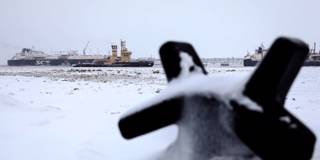The more that global warming reduces the ice cover in the Arctic, the greater the need there will be for multilateral arrangements to govern trade, resource extraction, and other issues across the region. Without forward-looking cooperation, a zero-sum scramble will ensue, leaving everyone worse off.
STOCKHOLM – Whether we are heading for a future of cooperation or of increasing confrontation in the Arctic remains to be seen. But it is already clear that the region will command far more attention than it has in the past.
The main reason is of course climate change, which is accelerating the rate of ice melt and causing arctic temperatures to rise twice as fast as the global average. Owing to their pace and scale, these changes have obvious geographic, economic, and strategic implications. As the vast ice sheet that spans the region has melted, new fossil-fuel reserves and shipping routes have opened up, including the Northern Sea Route (NSR) along Russia’s Siberian coast and the Northwest Passage through Canada’s northern archipelago. However, the same trend has also fueled the loss of permafrost, threatening billions of dollars’ worth of infrastructure that may soon be standing in mud instead of on firm ground.
Moreover, indigenous communities that have lived in the Arctic for millennia are increasingly voicing concerns about the growing threat to their livelihoods. Nearly half of the Arctic’s land area is in Russia, as are around 70% of the four million people who live in the region. Most live in the Kola Peninsula area near Norway and Finland, which is also home to Russia’s Northern Fleet and most of its sea-based nuclear deterrent. But other parts of the region are no less important, strategically and demographically. Approximately two-thirds of the inhabitants of Canada’s arctic areas are indigenous people, as are the vast majority of the 56,000 people living on Greenland (which itself is the size of a small continent).

STOCKHOLM – Whether we are heading for a future of cooperation or of increasing confrontation in the Arctic remains to be seen. But it is already clear that the region will command far more attention than it has in the past.
The main reason is of course climate change, which is accelerating the rate of ice melt and causing arctic temperatures to rise twice as fast as the global average. Owing to their pace and scale, these changes have obvious geographic, economic, and strategic implications. As the vast ice sheet that spans the region has melted, new fossil-fuel reserves and shipping routes have opened up, including the Northern Sea Route (NSR) along Russia’s Siberian coast and the Northwest Passage through Canada’s northern archipelago. However, the same trend has also fueled the loss of permafrost, threatening billions of dollars’ worth of infrastructure that may soon be standing in mud instead of on firm ground.
Moreover, indigenous communities that have lived in the Arctic for millennia are increasingly voicing concerns about the growing threat to their livelihoods. Nearly half of the Arctic’s land area is in Russia, as are around 70% of the four million people who live in the region. Most live in the Kola Peninsula area near Norway and Finland, which is also home to Russia’s Northern Fleet and most of its sea-based nuclear deterrent. But other parts of the region are no less important, strategically and demographically. Approximately two-thirds of the inhabitants of Canada’s arctic areas are indigenous people, as are the vast majority of the 56,000 people living on Greenland (which itself is the size of a small continent).